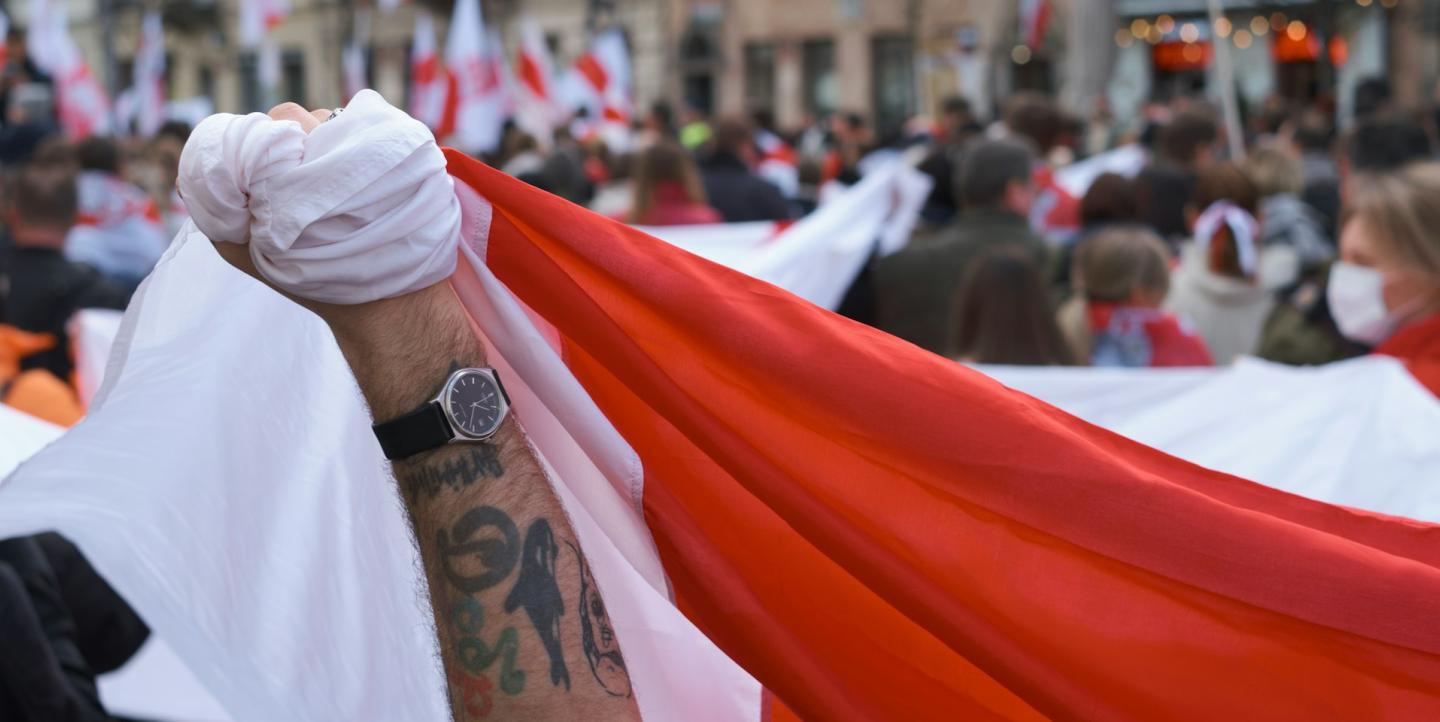More than 40 journalists and media workers are imprisoned in Belarus today.
The list includes journalists no longer active, such as Larisa Shchiriakova, who in August 2023 was sentenced to three and a half years in prison, and Ales Liubenchuk, who received a three-year sentence in 2022.
Some previously detained journalists have since left Belarus and now report from exile.
I spoke with them about returning to reporting after experiencing political persecution:
Olga Loiko
Up until the day of her arrest in May 2021, Olga Loiko served as editor-in-chief of the politics and economics section of Tut.By, the largest independent media outlet in Belarus at the time, which Belarusian authorities shut down that same year.
Loiko spent 10 months in a detention center before being released. Six months later, the government added her to their list of persons involved in terrorist activities, forcing her to flee the country.
Loiko viewed returning to work as a journalist as her only possible path forward. “As long as I have terrorist status, all other types of work, whether I am a hired employee or involve other people in my ‘criminal’ – according to the regime – activities, are out of the question. I am not prepared to jeopardize the lives of the people [in Belarus] who are ready to give me a job or work for me,” Loiko said. “Since the state has labeled me a terrorist, I have to live up to the title.”
It was important for Loiko to support her Tut.By colleagues who also fled Belarus. “People are really in danger while they are in Belarus. Everyone keeps telling them to leave, but where should they go? Our job is not fit for relocation; we specialize in Belarus,” she said. “It was important for me to make sure they could count on someone. When they are just told to leave, that's one thing, but when you offer them a job or a part-time job, that's important, and people agree because they have somewhere to go.”
As repression in Belarus continues, Loiko said she cannot sit idly by. In addition to the Lukashenko regime’s crackdown on its citizens, its complicity in Russia’s war on Ukraine is even more important to cover, she said.
Alexander Otroshchenkov
Alexander Otroshchenkov describes his work before his arrest in 2010 as lying at the intersection of journalism, public relations, activism and human rights.
As a journalist, he wrote for the independent news outlet, Charter 97, and served as a press secretary for the Zubr youth protest movement, the “European Belarus” campaign, and for presidential candidate Andrei Sannikov.
He was detained the day after Belarus’ 2010 elections when covering protests contending that the election results had been falsified. He was charged with participating in them and sentenced to four years in prison. Otroshchenkov had been detained about 50 times already by that time, having served several short-term sentences ranging between five and 15 days.
“I knew full well what I was doing, what I was risking and that one day I would probably end up in jail. But I was fortunate enough to end up there in relatively lenient times,” Otroshchenkov said. “Of course, there was pressure, torture, and – although I have no proof – the use of psychotropic drugs, but it was a very lightweight regime compared to the hell that today's political prisoners have to go through.”
Otroshchenkov was released after nine months in prison, when the Lukashenko regime was threatened with international sanctions. Almost immediately after his release, while still in Belarus, he returned to work. “I realized that I would be subject to increased attention for some time, and I tried to use it as much as possible to draw attention to those still behind bars. At that time I mostly traveled, made speeches, and cooperated very closely with Charter 97, but it was more activism, advocacy, human rights – not pure journalism,” he said.
Otroshchenkov left Belarus a year after being released, and later stopped working with both Charter 97 and European Belarus. “I was burned out and depressed, I needed a reset, so I started working as a taxi driver,” he said. “Still, I didn't leave journalism altogether. I continued to write as a freelancer and participated in research projects. Taking that time off helped, and I became curious again.”
In 2018, together with Fyodor Pavlyuchenko, Otroshchenkov founded the online news outlet Reformation, where he still works. They also co-host a YouTube show called “Sasha, what are you on about?” in which they infuse humor into political analysis of Belarus.
Inna
Inna* didn’t want to disclose the details of her identity, criminal case or past work for security reasons. Although she has been away from Belarus for a while now, authorities still have ways to put pressure on her and her family.
Before her arrest, Inna worked in journalism and media communications. After spending several months behind bars, she left the country and six months after her release she started reporting again.
While in prison, Inna experienced feelings of injustice and resentment, asking herself, why, if she worked so hard, did she end up in this situation? But living in exile is hardly easier, she said: “There is still a feeling of bitterness, and I don’t think I’m alone. It's just not really talked about. But I still feel like a hostage in this situation.”
Inna said she returned to journalism after her release out of financial desperation: “I am against the glorification of journalists and everyone else. We are not heroes, we are just people whose fates have been put through a meat grinder.”
When she was released from prison, she was told to understand that “there’s now a complete ban on her profession.” She was even invited to work for the government’s propaganda machine.
It became clear to her that she would not be allowed to live peacefully in Belarus, so she left. “I don't know what's in store for Belarusian journalism and what's in store for people who put in all their efforts and resources while earning very little,” she said.
Yevgenia Dolgaya
Until 2020, Yevgenia Dolgaya mainly wrote about social issues, such as the penitentiary system in Belarus and the conditions in which women serve their sentences.
She covered the 2020 protests in Belarus for foreign outlets, which couldn’t send their own journalists to report in person. She was arrested in front of her eight-year-old daughter while doing so, and spent three days in prison. While behind bars, she was threatened with a 15-year sentence, and authorities said they would send her daughter to an orphanage.
Some time after her release, Dolgaya was diagnosed with PTSD. To this day she still regularly thinks of the cell she was held in.
A week after her arrest, Dolgaya left Belarus for Ukraine and started to write about Belarusian students who had fled from repression, the murder of Raman Bandarenka in Minsk, and political prisoners and their families.
She often thinks about quitting journalism, she admits, though she can’t bring herself to do so. “I believe that all our journalists have ‘lifeguard syndrome,’” she said. “It seems to me that if I stop writing, I will betray the people who have been arrested and are still in jail: Marfa Rabkova, Katya Andreeva, Nasta Loiko. I think it’s important to endure, including for their sake.”
Dolgaya said she often considers how history was recorded during the time of the Soviet gulags and Nazi concentration camps.
“I kept thinking, ‘I can’t believe no one took on the responsibility to record everything that was going on.’ There are many books about people who survived the Gulag. But there are very few notes and memoirs of people who saw their neighbors being taken away, who described how the affected families lived afterwards. How come there wasn’t a single person who lived near a concentration camp and recorded what they saw?” she said.
“In the future, at least, we need [to be able] to explain to our grandchildren what the current repression were like. Because if we don't at the very least take the responsibility to record what is happening, the vicious circle will continue.”
Today, Dolgaya writes about women political prisoners in Belarus, describing their life behind bars.
The conditions there are very similar to a gulag, she said: women do not get proper nutrition and timely medical care, they are forced to work hard and dangerous jobs, leading to health problems.
*Inna is not this journalist’s real name.
Photo by Andrew Keymaster on Unsplash.


